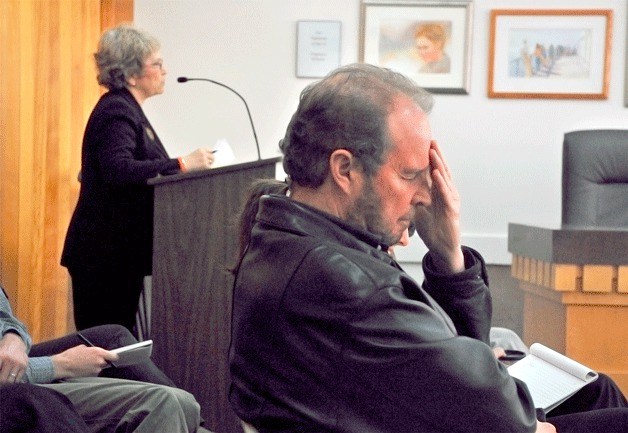A proposed change to Oak Harbor’s development rules has a member of the city council and a former state representative crying foul.
Claiming that the proposal is inherently linked to a property dispute that’s raged for nearly 10 years – a squabble in which both are involved as property owners – City Councilman Bob Severns and former state Rep. Sue Karahalios have been outspoken critics of the plan at a series of recent planning commission meetings.
Karahalios, who is also a former Oak Harbor city councilwoman, has even alleged that the rule change is an attempt to appease longtime Whidbey developer, Bill Massey.
“I think the city is responding to one applicant’s repeated pressure,” Karahalios said.
They worry that the new rules may provide the framework for Massey to develop vacant lots next to their homes, a development that has been mired in debate and legal proceedings for nearly a decade.
Oak Harbor Development Services Director Steve Powers adamantly denies the allegation, saying the two issues are completely separate. Although one could affect the other, he claims that the city is merely attempting to bring its existing rules into conformance with state law.
Pier Point
The entire issue revolves around the Pier Point Condominiums on Regatta Drive and Pioneer Way. The development was first created in the early 1990s under a planning document called a binding site plan. Essentially a long-range plan, it dictates what can and cannot be built on a property.
The original developer built about half of the total number of condos allowed in the site plan but failed to complete the whole development before the document’s specified construction timeline expired in 1999.
Massey purchased the undeveloped part of the property several years later and has been fighting over development rights with the residents of the Pier Point Condominium Association, and the city, ever since.
Both Severns and Karahalios are condo owners.
The issue has been heard by city officials, a hearing examiner twice, and is set to go back before an Island County Superior Court judge for the second time in April.
While the arguments vary in topic and complexity, the issue essentially boils down to whether or not the property can be developed. Massey claims that city officials assured him he could develop the property when he bought it.
“We never would have bought if it wasn’t developable,” he said.
Association members have a similar argument, saying they bought their homes under the belief that nothing else could be built due to the expired timeline. While not all are against development outright, many worry about what could be built and the use of shared rights, such as easements or public access.
Ironically, the entire issue could be moot. Massey said he’s retired from the development business and is considering donating all or a portion of the property to a charity group. It’s only worth about $200,000 – if a court decides it can be developed – and he’s really only fighting the issue for the sake of maintaining his property rights.
“It’s a principle issue with me,” Massey said.
New rules
The long-time property dispute boiled over into Oak Harbor government late in 2010 when the planning department proposed a change in the city code that would provide a process for altering already established binding site plans, such as the one governing the Pier Point condominiums.
Although the planning department has processed several binding site plans in the past under the city’s existing rules, Powers said it’s not the appropriate process outlined in state law.
“Unfortunately, that’s where we have egg on our face,” said Powers, during planning commission meeting this week.
Although he acknowledged that the shortcoming in the code was identified as a direct result of the city’s decision to reject Massey’s 2009 application to alter his binding site plan, Powers says the code change is a totally different issue and adamantly denies the implication that the city is catering to the pressures of a developer.
While the condo association owners worry that the new process would allow Massey to reapply,and possibly get approval to develop when past efforts have failed, Powers warned that is not necessarily the case. The rule changes would provide a process for property owners to alter binding site plans, as required under state law, but it in no way guarantees application approval, he said.
Further review
Although Powers tried in vain to keep the issues separate at a series of planning commission meetings, both the public in attendance and commissioners repeatedly broached the topic or attempted to discuss it under the guise of hypothetical scenarios.
Unsurprisingly, the issue was controversial there as well, with commissioners debating the merits of the policy changes over the course of three public meetings in December, January and February. Although the commission finally approved the proposal this week, the 4-1 vote was divided and their recommendation for approval was coupled with serious concerns over a variety of issues.
The matter may see similar controversy when it’s heard by the city council later this month. For starters, at least three city council members may have conflicts of interest. Severns is a property owner, Jim Palmer owns property very close to the Pier Point condos, and Rick Almberg was a longtime business associate of Massey’s.
According to Powers, the issue is a legislative matter, which means that city council members would be allowed to vote on the issue despite personal involvement. He declined to say whether any should recuse themselves, saying that each will have to decide for themselves what is appropriate.
The policy change is expected to be discussed at a standing committee meeting in March and then go before the city council sometime in April.




